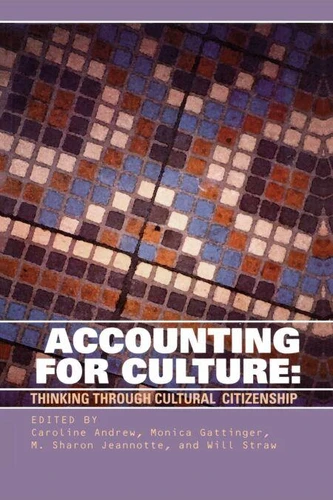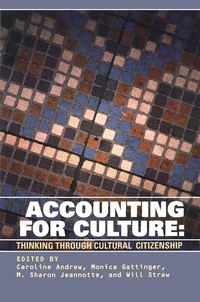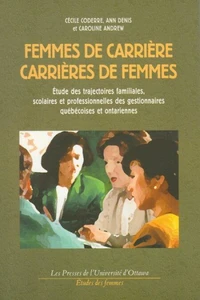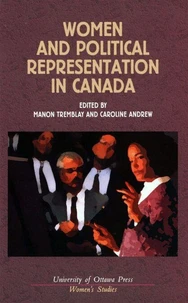Accounting for Culture. Thinking Through Cultural Citizenship
Par : , , ,Formats :
Disponible dans votre compte client Decitre ou Furet du Nord dès validation de votre commande. Le format ePub est :
- Compatible avec une lecture sur My Vivlio (smartphone, tablette, ordinateur)
- Compatible avec une lecture sur liseuses Vivlio
- Pour les liseuses autres que Vivlio, vous devez utiliser le logiciel Adobe Digital Edition. Non compatible avec la lecture sur les liseuses Kindle, Remarkable et Sony
 , qui est-ce ?
, qui est-ce ?Notre partenaire de plateforme de lecture numérique où vous retrouverez l'ensemble de vos ebooks gratuitement
Pour en savoir plus sur nos ebooks, consultez notre aide en ligne ici
- Nombre de pages300
- FormatePub
- ISBN0-7766-1863-6
- EAN9780776618630
- Date de parution30/03/2005
- Protection num.pas de protection
- Taille4 Mo
- Infos supplémentairesepub
- ÉditeurUniversity of Ottawa Press
Résumé
Many scholars, practitioners, and policy-makers in the cultural sector argue that Canadian cultural policy is at a crossroads: that the environment for cultural policy-making has evolved substantially and that traditional rationales for state intervention no longer apply. The concept of cultural citizenship is a relative newcomer to the cultural policy landscape, and offers a potentially compelling alternative rationale for government intervention in the cultural sector.
Likewise, the articulation and use of cultural indicators and of governance concepts are also new arrivals, emerging as potentially powerful tools for policy and program development. Accounting for Culture is a unique collection of essays from leading Canadian and international scholars that critically examines cultural citizenship, cultural indicators, and governance in the context of evolving cultural practices and cultural policy-making.
It will be of great interest to scholars of cultural policy, communications, cultural studies, and public administration alike. Published in English.
Likewise, the articulation and use of cultural indicators and of governance concepts are also new arrivals, emerging as potentially powerful tools for policy and program development. Accounting for Culture is a unique collection of essays from leading Canadian and international scholars that critically examines cultural citizenship, cultural indicators, and governance in the context of evolving cultural practices and cultural policy-making.
It will be of great interest to scholars of cultural policy, communications, cultural studies, and public administration alike. Published in English.
Many scholars, practitioners, and policy-makers in the cultural sector argue that Canadian cultural policy is at a crossroads: that the environment for cultural policy-making has evolved substantially and that traditional rationales for state intervention no longer apply. The concept of cultural citizenship is a relative newcomer to the cultural policy landscape, and offers a potentially compelling alternative rationale for government intervention in the cultural sector.
Likewise, the articulation and use of cultural indicators and of governance concepts are also new arrivals, emerging as potentially powerful tools for policy and program development. Accounting for Culture is a unique collection of essays from leading Canadian and international scholars that critically examines cultural citizenship, cultural indicators, and governance in the context of evolving cultural practices and cultural policy-making.
It will be of great interest to scholars of cultural policy, communications, cultural studies, and public administration alike. Published in English.
Likewise, the articulation and use of cultural indicators and of governance concepts are also new arrivals, emerging as potentially powerful tools for policy and program development. Accounting for Culture is a unique collection of essays from leading Canadian and international scholars that critically examines cultural citizenship, cultural indicators, and governance in the context of evolving cultural practices and cultural policy-making.
It will be of great interest to scholars of cultural policy, communications, cultural studies, and public administration alike. Published in English.









